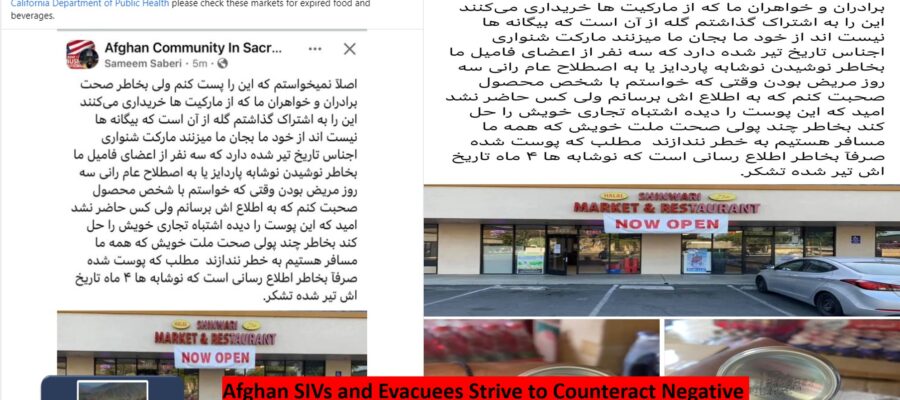Sacramento, CA — Since the U.S. withdrawal from Afghanistan in 2021, a significant number of Afghan Special Immigrant Visa (SIV) holders and evacuees have relocated to the United States, seeking safety and a fresh start for their families. Unfortunately, this transition has not been without challenges. Recent controversies have highlighted how some individuals are trying to undermine the reputation of Afghan-owned businesses in Sacramento, exacerbating tensions within the community.
A recent post on the “Afghan Community in Sacramento California” Facebook page, which boasts over 32,000 followers, has ignited controversy. The post, authored by a user named Sameem Saberi (real name Sameem Qadeer), claims that a local Afghan market sold expired products that led to illness in his family. The post reads:

“I originally didn’t want to post this, but for the sake of our brothers and sisters who buy from the markets, I am sharing this. The complaint is that it is not foreigners who are harming us but our own people. The market is selling products that are past their expiration date. Three members of our family were sick for three days after drinking Paradise soda or, as it’s commonly known, Rani. When I tried to contact the person responsible for the product to inform them, no one was available. I hope that by seeing this post, they will correct their commercial mistake and not put our health at risk for a few coins. The post is solely for informational purposes to let people know that the sodas are four months past their expiration date. Thank you.”

Kauser News Agency reached out to Sameem Saberi for further comments and medical documentation but received no response. The post has led to significant backlash against the Shanwari Market & Restaurant, with accusations of false advertising and potential harm to consumer health.
Responses from Local Businesses
Mr. Shanwari, owner of Shanwari Market & Restaurant, expressed frustration over what he perceives as repeated attacks on Afghan businesses via social media. He noted that this is not an isolated incident, citing a similar situation involving East Market and Restaurant months prior. Shanwari criticized the Facebook page’s administrators for allowing such posts without verification, potentially damaging the reputations of local businesses unjustly.

Shanwari emphasized that while he is not lodging a formal complaint, he is concerned about the lack of legal awareness among Afghan immigrants. He urged California law enforcement and district attorneys to increase educational efforts about defamation laws within the Afghan community.
Legal Perspective
Under California law, defamation encompasses both libel (written defamation) and slander (spoken defamation). To establish a defamation claim, one must prove that a publication is (a) false, (b) defamatory, (c) unprivileged, and (d) injurious. Notably, California Civil Code sections 44 and 45, along with relevant case law such as Smith v. Maldonado and Seelig v. Infinity Broadcasting Corp., outline the criteria for such claims.
In cases like the one involving Shanwari Market, where accusations are made publicly without substantial proof, businesses may have grounds for a defamation claim if it can be demonstrated that the statements were false and damaging to their reputation. Additionally, the notion of malice is not required for defamation claims, but evidence of malicious intent may influence the awarding of punitive damages.
The Afghan community in Sacramento, like any community, faces the complex challenge of navigating their new lives while maintaining their cultural identity. Missteps in communication, especially in public forums like social media, can have serious repercussions for local businesses and individuals. As Afghan SIVs and evacuees work to build new lives in the U.S., fostering mutual respect and understanding, along with increased legal awareness, will be crucial in overcoming these hurdles and establishing a positive community presence.





